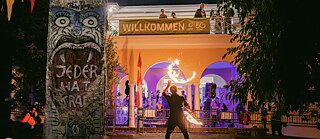
Learn German
Learn German from the market leader. We offer German language courses and exams in over 90 countries.
Visit us
Our offices in Australia
The Goethe-Institut has offices in Melbourne and in Sydney: the Goethe-Institut Melbourne opened in 1972 and the Goethe-Institut Sydney was founded in 1974.





